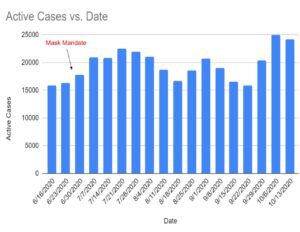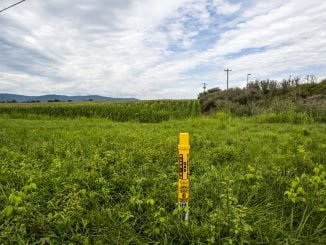
RALEIGH — Between the gubernatorial debate and the state’s elementary school children preparing to return to full-time in-person instruction, the topic of masks and face coverings is making the rounds again.
Wake County, the state’s largest district, will require all students to wear a mask or face covering, and the district is “strongly encouraging” pre-kindergarten students as young as four to wear one. Students will be required to “produce documentation” or “proof of a condition” for not wearing a mask. Those not complying could face suspension or be forced to attend class remotely.
Twice earlier this year, the World Health Organization (WHO) said that face masks were unnecessary for healthy people. Both the WHO and CDC have shifted language and varied guidance on masks over course of the pandemic.
During the Oct. 14 gubernatorial debate, Gov. Roy Cooper pushed wearing masks to prevent viral spread of COVID-19 several times. He also made the claim that COVID-19 cases had “leveled off” after he instituted a statewide mask mandate, however, the data indicates otherwise.

By placing the date of Cooper’s mask mandate on a weekly chart of the state’s COVID-19 cases, the claim that the mask mandate leveled off cases is untrue given the continued to rise and fall of cases.
Cooper’s mask mandate stayed in place with the announcement of Phase 3 at the end of September, yet according to the N.C. Department of Health and Human Services’ COVID-19 dashboard, the state’s cases rose to new highs in the weeks that followed.
On Oct. 15, Cooper held a COVID-19 briefing at which he said the state saw a new one-day record increase of 2,532 in new cases. The governor cited “complacency” by the public for the increased case count.
“Complacency will cost lives and hurt our economy, and it’s up to every one of us to continue wearing masks, social distancing and using good judgment,” said Cooper at the COVID-19 press briefing as he urged the public to practice safety protocols.
According to NCDHHS, the seven-day average for new cases at the time of the press briefing was 1,935 — up from around 1,784 the week prior. It has been suggested that the state’s case numbers are inflated because North Carolina has been using PCR Test Cycle thresholds (Ct) of 37 when the CDC recommends that the Ct should not be any higher than 33.
Cooper did not say if he would return the state back to Phase 2 restrictions or if the case increase might mean extending Phase 3 which is set to expire at the end of this week on Oct. 23.
A recent North State Journal op-ed by Dr. S. Stanley Young, Ph.D., an EPA Scientific Advisory Board member and applied statistician, looked at whether or not masks were effective in preventing the transmission of both influenza and COVID-19. The overarching question in the op-ed is, “Why does Dr. Cohen insist that we wear masks?” The answer Young came to was that there appears to be no benefit to wearing a mask and that “Medical masks were not effective, and cloth masks even less effective.”
Young said he brought his findings to NCDHHS secretary Mandy Cohen and her staff. Young heard back from a senior official on Cohen’s staff who gave him another study that was COVID-19 specific.
“The study he sent was a meta-analysis that looked at transmission of the virus. A total of 19 randomized studies were summarized,” wrote Young. “Here is what they had to say, ‘Medical masks were not effective, and cloth masks even less effective.’ They also noted that ‘…respirators, if worn continually during a shift, were effective but not if worn intermittently.’
“Mechanistically, masks have always only been thought to stop large droplets. Transmission through very fine droplets cannot be stopped by ordinary masks. Most recently, the CDC has confirmed that the virus can be transmitted through fine droplets,” Young wrote. “The meta-analysis that Mr. Fleischman had sent me supports this claim because, again, it showed no benefit to wearing masks. Incidentally, the Netherlands recently dropped the mask mandate saying the research did not support wearing them.”
The CDC’s guidance on mask wearing describes masks and face coverings to as a “a simple barrier to help prevent respiratory droplets from traveling into the air and onto other people,” yet recent findings of a CDC study on on-site eating and drinking establishments suggest mask and face coverings are not effective for blocking transmission of the virus.
The study included a total of 314 people, of which 154 were symptomatic and tested positive in July, and a control group of 160 symptomatic people who tested negative that same month. The topline findings showed that for the 154 participants testing positive, 70.6% of them stated they “always” wore a mask/face covering and 14.4% said they “often” wore one. Conversely, out of the 160 participants testing negative, 74.2% stated they “always” wore a mask/face covering and 14.5% said they “often” wore one.



